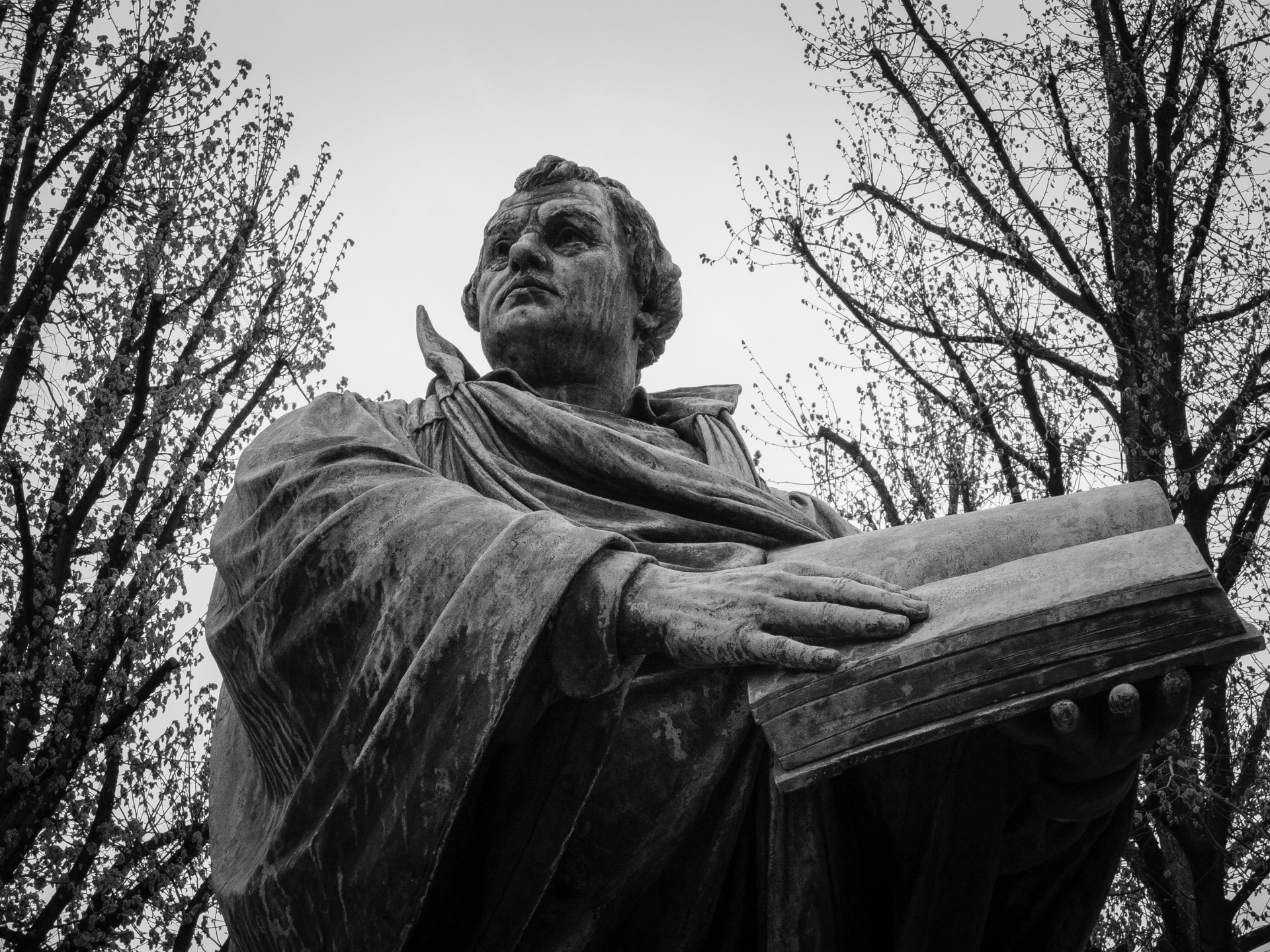Why Western thought—and your own beliefs—owe a debt to one German monk.
“I cannot and will not recant anything, for to go against conscience is neither right nor safe. Here I stand; I can do no other. God help me.” With these words, rebellious German monk Martin Luther defied the most powerful institutions of his day: the Holy Roman Emperor and the Pope of Rome. In doing so, he unwittingly unleashed a maelstrom that would go on to change the trajectory of world history. Perhaps he never intended to change history. Yet in his challenge of the ultimate authority on earth, Luther planted a seed—a seed that when fully grown, would produce the modern era. You may not realise it, but Luther’s spiritual crisis also created you.
Our story begins with a young law student caught in a thunderstorm outside the village of Stotternheim in Saxon Germany. The young Luther initially studied law at the behest of his overbearing father, who hoped his son would become legal counsel to his copper mining business. Then, one day as he returned to university on horseback, he was caught in said thunderstorm. Terrified of either the storm or God’s judgement, he cried out, “Saint Anne help me! I will become a monk!”
Saved from the thunderstorm, Luther felt compelled to uphold his vow, so (much to his father’s chagrin) he entered an Augustinian monastery in 1505. Hoping to find peace from God’s condemnation (or was it his father’s?), he threw himself into asceticism—fasting, hours in prayer and constant confession. But none of it soothed his sense of internal unrest. “I lost touch with Christ the Saviour and Comforter, and made of Him the jailer and hangman of my poor soul.”[1] The more Luther tried to please God, the more he felt condemned. How could He be a God of love if His demands were so impossibly high? How could He create people with such a capacity for sin, if their only destination was hell? Did God delight in creating people incapable of attaining salvation? In his own words, “I was myself more than once driven to the very abyss of despair so that I wished I had never been created. Love God? I hated Him!”[2]
From cloister to classroom
Luther’s confessor and exasperated mentor, Johann von Staupitz, concluded that what Luther needed was more work, so Luther entered the world of academia. His first posting was to the University of Wittenburg, where he would remain for the rest of his academic career. Obtaining a doctorate and succeeding von Staupitz as chair of theology, he began lecturing.

It was during these years teaching that Luther immersed himself in the Bible in a new way. Free from the asceticism of the cloister, Luther began to see the New Testament with new eyes. In particular, the phrase “the just shall live by faith” arrested his attention. Entranced by the New Testament letters of Romans and Galatians, a new idea began to form in his mind. But to understand it fully, we must take a step back.
Cradle to grave
In the medieval world, the Church held a monopoly over life and death. To be “saved” from hell and go to heaven when you die, there was a series of steps you, the average person, would be required to go through. First, you would need to be baptised as an infant by a priest. Then, you’d need to declare your belief in the Church’s teachings as taught by the Church and live a life of good works. Keep the Ten Commandments, do acts of charity, observe all festivals and holy days, and fulfil your social responsibilities. Then, you’d need to participate in Mass and partake of the sacraments—all seven. Baptism and confirmation were the first two, then the Eucharist (Lord’s Supper), penance (confession), anointing of the sick, holy orders for clergy and matrimony for everyone else. When death came near, with the help of a priest you would need to deal with all your sin, to ensure you die in a “state of grace.” A final confession would be needed, last rites would be administered, then (if needed) an indulgence (essentially a bribe) would be purchased to reduce your time in purgatory.
The Mass service and all its sacraments could only be administered by one person: a priest. Suffice it to say, the Catholic Church had a literal stranglehold on the lives of everyone in medieval Europe. It didn’t matter if you were a prince or a pauper—every person’s soul was in mortal peril and was reliant on priestly intercession. So, when Luther discovered that “the just shall live by faith”, it changed everything for him. Rather than participating with God’s salvation, Luther realised that salvation is a gift from God. In other words, the sacraments were pointless as a means for earning one’s place in heaven—as well as avoiding being sent to hell. As Luther said himself, “I can only rely on God, who has committed Himself to my salvation.”[3] So transformed was Luther that he later reflected, “I felt as if I had been born again: the gates had been opened and I had entered Paradise itself.”[4]
“Here I stand”
This brings us to where we began: the infamous council in 1521 where Luther uttered his famous phrase: “Here I stand; I can do no other. God help me.” This declaration of personal conviction in opposition to institutional authority became a defining moment—not only for Luther, but for the movement that began because of him. As a result of his influence, a gradual shift began to overtake European thought. Soon all of Europe would be ignited by “that fire which all the world shall never be able to quench.”[5] But Luther’s legacy extends far beyond theology. Philosophers like Immanuel Kant (1724–1804) were influenced by Luther, famously claiming to have “found it necessary to deny knowledge in order to make room for faith”. GWF Hegel (1770–1831), a Lutheran himself, integrated Luther’s ideas on freedom into his own philosophical system but subordinated them to reason. Søren Kierkegaard (1813–1855), also a Lutheran, was inspired by Luther but was critical of the denomination that bore his name.

We could mention other figures like Nietzsche, Marx, Feuerbach or Heidegger—all who engaged with, were influenced by or criticised Luther’s work and legacy. Maybe you’ve read from some of them—or maybe you’ve never heard of any of them. What matters is, if you’ve been influenced by Western thought, your thinking has been influenced by these figures, which also means your thinking has been influenced by Martin Luther.
It’s not just that you’ve been influenced by him, either. Though Luther could never have known the long-term ramifications of his decisions, he nevertheless began a movement that would go on to reshape not only the Western world’s religious life but also its political, social and philosophical landscape. Whether you believe in God or not, how and why you believe is thanks in no small part to one German monk from the 16th century.
So, on Reformation Day this October 31, when the kids in your neighbourhood are dressed in Spider-Man and Elsa costumes, begging for Halloween sweet treats, lend a thought to Martin Luther—the man who abandoned the “god” of the Church dogmatism and rediscovered the God of the Bible, and whose love for that God changed history forever.














